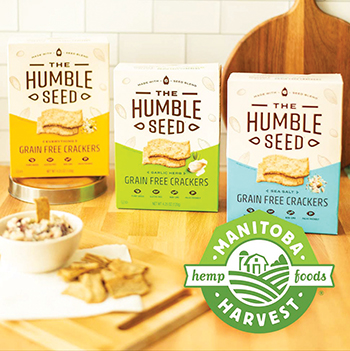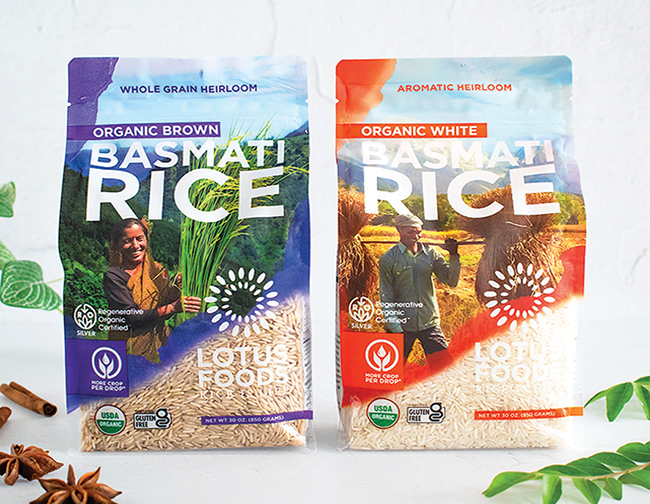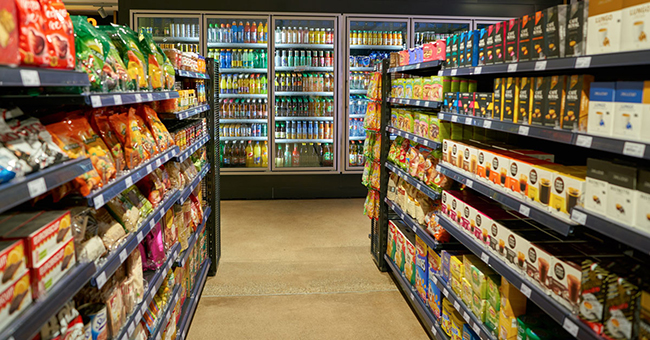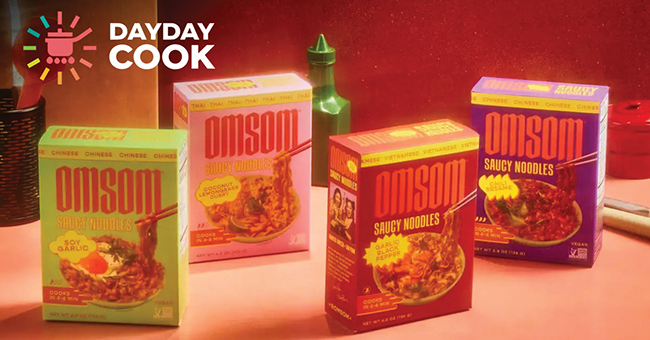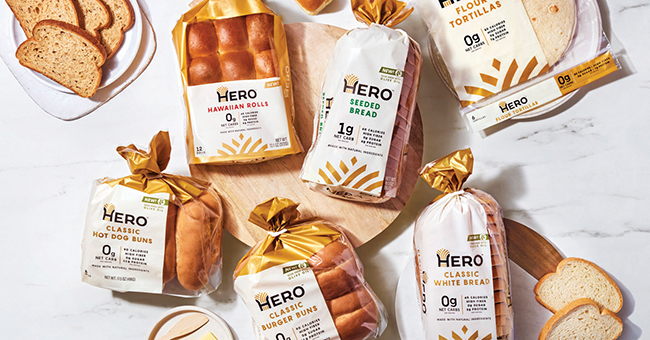NOSHscape: The Latest Food Brand News
Seeding Growth: Why CBD Giant Manitoba Harvest Is Hungry For Snacks
Canadian hemp food producer Manitoba Harvest Hemp Foods has acquired The Humble Seed in an asset purchase that includes IP, brand and formulations. The terms of the deal were undisclosed.
Manitoba Harvest, one of the largest hemp food producers in the world, had been exploring how it could move deeper into the snacking category either by building a brand itself or “looking for a partner with a running start,” said company president Jared Simon.
As Manitoba’s first foray into crackers and the snack category under its Fresh Hemp Foods Ltd. division, The Humble Seed — which makes three varieties (Sea Salt, Everything and Garlic Herb) of crackers made from a blend of sunflower, flax, pumpkin, sesame, chia and hemp seeds — ticked a lot of boxes for Manitoba from a nutritional and sustainability standpoint as well as being a “seed-forward” brand, he added.
Launched in 2022, The Humble Seed had grown its retail footprint over its two years into 2,000 stores including Sprouts, H-E-B, Fresh Thyme, The Fresh Market and HyVee with a SRP of $5.99 per 4.25 oz. box. But at the beginning of 2024, the Denver-based brand had reached an “inflection point” in its growth trajectory, said co-founder Sarah Meis, who was running the brand with partners Steve Shaffer and Jennifer Mancusco.
“We were prepared to continue to run the brand,” she said, but were exploring “what the next stage looked like for us.”
What started as a dialogue about a partnership between the two brands at Expo West in March developed quickly into “ongoing conversations” about how Manitoba Harvest could put more resources into “shepherding” the grain-free crackers into a “new phase of growth,” Meis said.
It is telling of an increasingly difficult environment for startup brands to operate independently and raise new capital.
“It’s no surprise that young brands need financial resources in order to grow. Growth doesn’t come without that cost,” she said. “It is one of the challenges where small brands are always very disadvantaged. We don’t have the supply chain relationships and the sort of purchasing power that a larger umbrella organization could.”
Founded in 1998, Manitoba Harvest produces a variety of hemp seed ingredients including granola, oatmeal, oil and powdered supplements. The company was acquired from Compass Diversified Holdings in 2019 by cannabis company Tilray.
Simon said that Manitoba Harvest will leverage its logistics, sourcing and procurement resources to begin to scale the cracker brand. Initially, The Humble Seed will not be produced by Manitoba because it doesn’t currently have cracker making equipment, though there are plans to innovate within the hemp seed company’s “snack-making capabilities.”
Manitoba Harvest owns two production facilities in Canada.
The hemp food producer plans to “infuse” some investment in the cracker brand while utilizing Manitoba’s sales team and network of brokers to “accelerate” The Humble Seed’s retail footprint.
Snacking appears to be ripe terrain for acquisitions. Newly launched CPG private equity firm Forward Consumer Partners snatching up cracker maker Firehook Bakery and Dallas, Texas-based tortilla chip and salsa brand Xochitl between April and May. Dried fruit maker RIND vertically integrated its supply chain by acquiring Vermont granola manufacturer Small Batch Organics at the end of 2023.
As for Meis, who previously held senior level positions at Good Karma, Lily’s Sweets, Purely Elizabeth and Van’s before founding The Humble Seed with Shaffer and Manusco, she will no longer be involved with any decision making for the grain-free snack brand. For now, Meis will be taking a little time off but plans to announce what’s in store for her next chapter soon.
“One of the things that I learned about being a founder was, honestly, I missed working on a team,” said Meis. “I had my co-founders, but there’s a lot of being an entrepreneur that’s pretty solitary.”
Lotus Foods Raises $22.5 Million To Grow More Regen Rice
Thirty-year-old Lotus Foods has weathered plenty of challenges with minimal outside investment. But now the regenerative and heirloom rice, noodle and ramen producer is going after growth, after announcing in July it has raised $22.5 million from San Francisco-based firm Grounded Capital to “scale its impact,” Lotus CEO Andrew Burke told Nosh.
“What makes [Lotus founders] Ken [Lee] and Caryl [Levine] very unique is they take the long view – we wanted to make sure that we found the right partner,” Burke said, explaining that the team spent nearly three years searching for the right investor.
Stephen Hohenrieder, CEO of Grounded Capital, and William Culler-Chase, principal, will join Lotus’ board of directors as part of the deal.
Burke said internal conversations about how to finance the company’s next stage and scale its smallholder farming network have been simmering for a long time. He joined Lotus in 2019 as the company’s first c-suite executive, serving as president and COO, before moving into the CEO spot in 2023.
The investment decision was based around the idea of increasing consumer exposure while deepening the company’s ability to positively affect its base of regenerative farmers, Burke said.
“We had two decisions: go seek outside capital to accelerate that, or continue what they were already doing.”
The new funds will be deployed in three main areas: First, Lotus intends to deepen its investment within its existing farmer supply network and support those partners’ continued transition to regenerative agricultural practices. Lotus farmers currently use a unique growing method known as System of Rice Intensification (SRI) which it claims uses half the amount of water and 90% less seed and emits 40% less methane while producing two to three times greater yields.
Second, the company will expand its supplier network and its growing method to new regions. That means Lotus’ will begin to bring its unique growing practices, a process which it has trademarked under the name More Crop Per Drop, to new countries. Currently, Lotus sources from farmers across Cambodia, Thailand, Indonesia, China and India.
And third, the funds will be put towards the company’s own infrastructure, Burke said, which will “allow us to broaden our customer base so that we can bring these great products to more people.” In practice that will see Lotus expand to additional retail doors, grow its portfolio and place a greater focus on engaging with consumers.
“We want to bring the Lotus story to a lot more people… we haven’t been able to interact with people and to make sure they understand what we are all about [in the past],” Burke said. “This investment enables us to do that from consumer understanding to consumer marketing, to the development of new, innovative platforms that use our products and present them to a consumer in a more convenient way. All of those things will be considered.”
Currently, Lotus Foods sells a lineup of over 40 SKUs spanning rice, rice noodles, ramen, heat-and-eat pouches and soup cups. The products are distributed to 9,000 stores across the U.S. including Whole Foods, Costco, Walmart, Wegmans, Safeway and Publix; the company also distributes to Canada.
Burke highlighted the environmental impacts that the industry as a whole has been faced with over the past few years, noting that it was another factor that weighed on the agriculture-based business’ financing decision. He said navigating those challenges further supported that Grounded is the “perfect partner” for Lotus because “they truly take an improving food systems approach to their investments – they think very broadly and thoughtfully, and it is very refreshing.”
With over two decades of industry experience, including serving as CEO of TCHO Chocolate and holding a range of senior positions at companies like E&J Gallo Winery, Diamond Foods and Nature Box, Burke knows a thing or two about guiding a CPG business through a period of growth. While he noted the current climate for investment is tough, he believes there are key focal areas that set a business apart from the competition.
“You have got to focus on the proposition. You have to focus on what your value offering is. You have to focus on what your impact is and how you’re going to make something different that consumers are going to want more than another product because of particular attributes it has. It gets into storytelling, it gets into building systems – it gets into building a brand.”
Report: Food and Beverage Innovation Plummets Nearly 50% in 2024
A combination of rising ingredient prices, raw material shortages and downsized product portfolios has left creativity in short supply for many CPG companies. According to a new Mintel report, only 35% of global CPG launches spanning the food, drink, household, health and beauty industries in 2024 have been genuinely new products – the lowest rate of innovation since Mintel began tracking new products in 1996.
The global downturn in CPG innovation is most prominent in North and Latin America. In the U.S., only 25% of CPG launches were new products in the first five months of 2024, compared to the global average of 35%.
What’s more? Food and beverage has seen the greatest innovation decline of all CPG sectors, accounting for only 26% of new products across all CPG innovation between January and May 2024 versus 50% in 2007. Per the report, F&B companies are favoring a renovation approach – like reformulations, new varieties, range extensions and new packaging – to offer consumers new, yet familiar, choices.
In the past few months alone we’ve seen an influx of brand refreshes from Lexington Bakes, Barritt’s Ginger Beer and MOSH as well as line extensions from Kooshy, Laoban, PLEZi and more.
There’s some good news for smaller brands: Bigger no longer equals better. A lack of R&D investment from large brands after the 2008 financial crisis created an environment in which startups like OLIPOP tapped into the rise of digital technology and gained a foothold in their categories. According to NielsenIQ data, 45% of growth in CPG between 2016 and 2020 was driven by small- and medium-sized brands, while private label captured 30%.
“As the digital transformation of CPG gathers pace, the old adage ‘innovate or die’ will never be truer, especially given that big brands have been growing more slowly than challenger brands and private-label. If big players fail to innovate more, this trend will dramatically increase as we enter the late 2020s,” the report reads.
Should Big CPG make an innovation comeback, it will face two key hurdles: artificial intelligence (AI) and private-label brands. Here’s the lowdown:
The rapid emergence of AI and ecommerce has lowered the barriers to entry for emerging brands, allowing them to build brand equity and sales online before shifting into brick-and-mortar retail. Also, tech advancements have cut year’s long innovation cycles down to just months.
Continued inflation has supported a switch to private-label alternatives (see: recent private label refreshes from Walmart and CVS). In May, 31% of U.S. adults said they purchased more store brands over the past two months.
Without genuine innovation, will consumers automatically return to big brands once they feel more financially secure? According to Mintel, unless the current innovation drought is reversed, the future profitability of, and potentially the survival of, established CPG industry players remain at risk.
DayDayCook Acquires Omsom
Asian sauce and noodle brand Omsom announced in June it has been acquired by growing multi-Asian food brand platform DayDayCook. The deal will consist of a combination of DDC cash and stock which will be paid out over a four-year term.
Five non-executive employees of Omsom have been granted 160,000 shares of DDC’s Class A Ordinary Shares as part of their employment package. Omsom co-founders and sisters Vanessa and Kim Pham will remain involved with the company following the close of the transaction as a strategic advisor and in a “fractional capacity,” respectively, according to their LinkedIn posts.
Joining forces with DDC will allow Omsom to accelerate new product development, according to the announcement, with the brand expecting to be able to slash its R&D timeline in half under the ownership of the Asian food platform. The news also marks a continuation of DDC’s M&A streak over the past year. The company, which went public in November, acquired noodle kit and meal brand Nona Lim in August and Asian sauce maker Yai’s Thai in December.
“Our presence in the U.S. is rapidly growing with the addition of Omsom to our U.S. family of brands,” said DDC founder Norma Chu, in a press release. “Having three notable Asian food brands in our portfolio will create enhanced synergies and resource integration, and make our operations more efficient and profitable.”
Omsom, which produces a 7-SKU line of sauces and expanded into the noodle category last May with three varieties of its Saucy Noodle line, is well positioned to capitalize on the growing manufacturing and operational infrastructure behind DDC.
DDC was founded in Hong Kong in 2012 as a content and recipe platform and used its acquisition of Nona Lim to expand its reach into the U.S. The company, which sells its own line of ready-to-eat meals internationally, seeks to build a platform where emerging Asian food brands can grow through shared operational resources, telling Nosh in February it aims to become the “General Mills for Asian food” in the U.S.
“In the last couple years, our rowdy branding, damn delicious flavors, and unapologetic perspective have illuminated the way – and now, those same values are showing us to our next chapter,” said Omsom co-founder Kim Pham, in a press release. “They say, ‘If you want to go fast, go alone, but if you want to go far, go with others,’ and that’s what we’re excited to do with DayDayCook.”
DTC-native Omsom has been steadily growing its presence in U.S. retail since its launch in 2020, growing revenue in the grocery channel 324% year-over-year, and is now sold in over 2,000 stores nationwide including Whole Foods Market, Target, Sprouts and The Fresh Market. But as the brand looked to continue growing, it returned to its digital roots and, like others within DDC’s portfolio including Nona Lim, struck up a discussion of a potential deal via social media.
“It all started with a LinkedIn message to Norma, when we first read about DayDayCook’s vision and mission, we knew we had to get in touch immediately,” said Omsom CEO and co-founder Vanessa Pham, in a press release. “We are thrilled that Omsom, which has been built brick-by-brick with heart and intention, will continue to thrive in partnership with DayDayCook.”
Hero Bread Raises $21 Million
Better-for-you bread is turning into a big business. Hero Bread announced in June the closing of a $21 million funding round co-led by Cleveland Avenue, DNS Capital and Composite Ventures. The round, in which existing investor Greatpoint Ventures also participated, brings the company’s total funding to over $68.5 million to-date.
Despite the challenging investment climate for growth-minded CPG brands, Hero Bread CEO YuChiang Cheng said investors responded positively to the product’s disruptive positioning and market validation it has garnered in just two years since launch, allowing the company to close this latest round in less than three months.
“The numbers don’t lie,” Cheng said. “As [our investors] dug into the market share, the repeat rates, the velocity at the retailers we have, the fact that we’re top of the category in all our sets and have a ton more demand from more retailers, they felt with that momentum, and that the product is really superior to everything else out in there, that it really stands head and shoulders above everyone else – and in a very large category that addresses everybody.”
Hero Bread produces a 6-SKU line of alternative breads made from a combination of resistant wheat starch, wheat protein, milled flaxseed, fava bean protein, allulose and monk fruit in addition to a limited-edition array of items such as Cheddar Biscuits and Croissants. The bread loaves retail for between $9 to $10 while the tortilla format costs about $8 per pack.
While initially aimed at the carb-avoiding keto crowd, the brand has extended its appeal to the point where about 50% of its purchasers are non-keto folks. The product’s nutritional profile – between 0 to 2 grams of net carbs and no sugar, plus lower calories, but more protein and fiber per serving than conventional bread – has helped.
As for its new funds, Hero intends to put the cash towards building up inventory, supporting existing retail partners and growing its footprint in physical retail; currently, the brand is on-shelf in over 4,000 doors nationwide – a large jump from 20 stores at the start of 2023. It has also now established a greater presence in conventional grocery stores, which contribute slightly more than 50% of retail sales in MULO.
In the natural channel, Hero’s new capital will support existing retail partnerships, particularly with Sprouts and Fresh Thyme as well as Publix.
“We wanted it to perform in all the different channels, and it’s proven out to a larger degree than we would have thought,” Cheng emphasized.
He credits that performance to the product’s taste, texture and nutritionals, the latter of which were confirmed after the company’s investors ran independent third-party tests without their knowledge. In order to continue capitalizing on its momentum, Hero will invest heavily into consumer education and particularly sampling, as Cheng acknowledged many consumers have gone stale on better-for-you breads due to historically sub-par taste, texture and nutritionals.
This funding round may also send signals around how investors are assessing CPG ventures in the current climate. Cheng pointed to the category itself as a point of differentiation and validation, emphasizing that bread is a regular purchase for most consumers, rather than a novelty like many plant-based protein alternatives.
For further validation of the brand’s goal to build a loyal following, Cheng pointed to the brand’s repeat rates of 50% at retail within a month of purchase and to the fact that Hero’s average ecommerce consumer places upwards of three orders per year. He also said the price point keeps the items accessible, only tagged slightly above the premium conventional alternative, while noting its customers have an average annual household income of $60,000.
These focal points are also indicative of the brand’s strategy looking ahead. When Hero Bread first launched, it aimed to align itself as the “Beyond Meat of better-for-you bread,” but Cheng said that position no longer holds up. Now its focus is on traditional bread baking techniques, rather than something grown in “a lab tube.”
Cheng took over as CEO from Hero founder Cole Glass in November as its retail presence was ramping up. He originally became involved as an investor while working with The Family Fund (that of TikTok-famous family The D’Amelio’s), but was “almost immediately” asked by the board to serve as the brand’s CMO.
He said the move to the top spot came after some “self reflection” from Glass and the core team that the business could, and should, move faster: “There’s just a lot of patterns and success routines that I can bring to the table [quicker],” Cheng said.
Those routines will see the business balance growth with a sustainable mindset, Cheng said, explaining that while it is taking “calculated growth opportunities,” Hero could be profitable if it wanted to be since the business’ basic fundamentals are solid.


Receive your free magazine!
Join thousands of other food and beverage professionals who utilize BevNET Magazine to stay up-to-date on current trends and news within the food and beverage world.
Receive your free copy of the magazine 6x per year in digital or print and utilize insights on consumer behavior, brand growth, category volume, and trend forecasting.
Subscribe